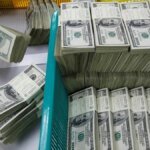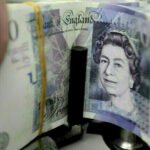June 10 (Reuters) – The United States is merrily chipping away at the pillars that hold up the dollar as the world’s reserve currency, with the latest blows coming from some powerful Americans questioning the rule of law following the conviction of Donald Trump.
In doing so, it is effectively daring the rest of the world to find an alternative – and so far, it appears to be winning.
Over the past three weeks, I have been asking financial services executives, global investors and other experts in Asia and the United States how long they think the Americans can keep at it without meaningful blowback. Several of the sources requested anonymity to speak candidly about the situation.
These conversations showed consternation is growing, both at home and abroad, about the consequences of U.S. hubris. But despite trying, no one so far has been able to find a credible alternative or expects one to emerge anytime soon, and they have partly themselves to blame.
But attempts to build such systems are slow-going or haven’t gotten traction. And rising authoritarianism, threats to individual and property rights and geopolitical tensions have meant that even if U.S. assets are less attractive than they were before, other options are worse.
“Perhaps ironically, the U.S. dollar’s strength is, in part, due to its near-unchallenged safe-haven status,” said Steve H. Hanke, a professor of applied economics at Johns Hopkins University, who served on former President Ronald Reagan’s Council of Economic Advisers. “That said, most investors don’t understand geopolitics and the dangers that lurk below the surface – until it’s too late.”
DOLLAR’S DOMINANCE
At its core, the dollar’s dominant role in the world draws from the United States’ democratic principles. It is supported by the massive size of its economy, the depth of its markets, and the strength of its institutions and the rule of law.
“I believe in this constitutional system that we have. It’s messy,” Gensler said. “It’s democracy.”
Nevertheless, the messiness is testing some of the underpinnings of the dollar’s global appeal.
Attacks on the U.S. legal system have increased after the Trump verdict in a New York court. Florida Governor Ron DeSantis, for example, called it a “kangaroo court” on the social media platform X, saying “the verdict represents the culmination of a legal process that has been bent to the political will of the actors involved.”
Trump’s campaign for his Republican presidential bid has played down such reports of what conservative groups might be planning.
THICKET OF SANCTIONS
A senior New York-based financial services executive who was traveling in Asia said he is hearing from clients who think the U.S. and Western financial policy is “undermining the dollar and the Western financial system more broadly.”
He pointed to an “ever expanding thicket of sanctions” as one reason.
An October 2021 Treasury Department review of sanctions found such designations had increased to 9,421 by that year from 912 in 2000. It noted at the time that “American adversaries — and some allies — are already reducing” their use of the dollar.
If no proof is publicly offered, then it would “feel that the checks and balance, the independence of the legal system, may not be there — at least in this case,” the investor said.
But then he added that even that may not turn him away from the United States. It’s still more independent and better than many other places, he said.
Sign up here.
Reporting by Paritosh Bansal; Editing by Anna Driver
Our Standards: The Thomson Reuters Trust Principles.















